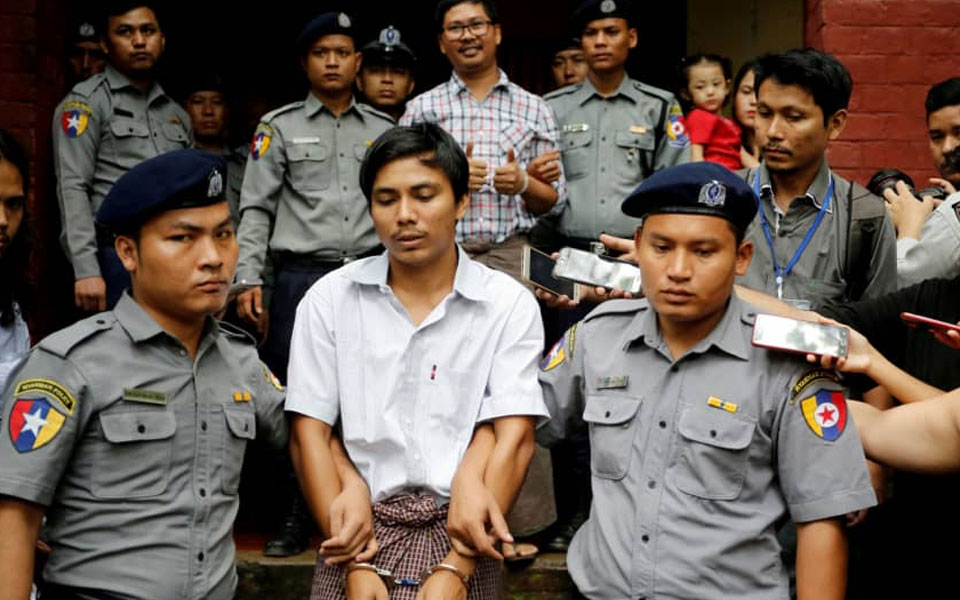Naypyidaw: Myanmar's Supreme Court rejected the latest appeal Tuesday by two Pulitzer-prize winning Reuters journalists who were jailed for seven years on charges linked to their reporting on the Rohingya crisis, as hopes now turn to a presidential pardon.
Reporters Wa Lone, 33, and Kyaw Soe Oo, 29, have been behind bars since their arrest in December 2017 under the colonial-era Official Secrets Act.
They were convicted of possessing classified documents relating to security operations in Rakhine during a brutal military crackdown against Rohingya Muslims that forced some 740,000 to flee over the border into Bangladesh.
The initial ruling in September was upheld by the Yangon High Court in January. On Tuesday, the reporters were not at the Supreme Court in the capital Naypyidaw to hear the ruling that once again went against them.
Under Myanmar's judicial system, the Reuters journalists could take their appeal back to the Supreme Court judges twice more, but it is unclear whether they will try this option or if they will pin all their hopes on a pardon.
"Our appeal was rejected," Khin Maung Zaw told AFP.
"They upheld the ruling of the lower court."
He added that the reporters had indicated they did not want to continue with the legal process but a final decision had not yet been made.
Both of the journalists' wives were at the Supreme Court for the ruling and spoke side-by-side to reporters afterwards.
"I'm very upset by the Supreme Court's decision," said Chit Su Win, wife of Kyaw Soe Oo, visibly fighting back tears. "We really hoped our husbands would be released but it hasn't happened."
Supporters believe the pair were punished for investigating a massacre of 10 Rohingya in Myanmar's western Rakhine state in September 2017.
The story earned the team the Pulitzer, one of the top honours in journalism.
Myanmar's armed forces insist the brutal campaign in Rakhine was justified as a means to root out Rohingya militants. But soldiers involved in the massacre investigated by Reuters were jailed.
The case against the journalists has become a cause celebre for press freedom.
Prominent rights attorney Amal Clooney joined the legal team, and Wa Lone and Kyaw Soe Oo were featured on the cover of TIME magazine.
But despite global outcry the two remain in Yangon's Insein prison. Rights groups and legal experts say the case against the Reuters reporters was riddled with irregularities.
A whistleblowing police officer testified during their trial that his superior had ordered his team to trap the reporters in a sting -- testimony the judge chose to ignore.
Officer Moe Yan Naing was initially called as a prosecution witness before breaking ranks in court.
"Wa Lone and Kyaw Soe Oo did not commit any crime, nor was there any proof that they did," Reuters Chief Counsel Gail Gove said in a statement following Tuesday's ruling.
"Instead, they were victims of a police set-up to silence their truthful reporting. We will continue to do all we can to free them as soon as possible."
Rights groups have urged Myanmar's civilian leader Aung San Suu Kyi to use her influence to secure this, but she has so far refused to intervene.
The Tuesday ruling prompted swift condemnation from rights groups, the UN and the US.
"The court decision is very disappointing -- it's a hopeless situation for the two journalists and for freedom of speech," said Maung Saungkha, founder of local rights group Athan.
The Asean Parliamentarians for Human Rights said they were "appalled" by the ruling, while the US embassy in Myanmar said "journalism, satire, peaceful protest, and other forms of legitimate expression should not be crimes in a democratic society."
Let the Truth be known. If you read VB and like VB, please be a VB Supporter and Help us deliver the Truth to one and all.
Dubai: Smoke was seen rising from an area near the United States Consulate in Dubai, according to witness accounts cited by Reuters.
There was no immediate official confirmation on the extent of damage or whether there were any casualties in the incident.
Earlier, the US embassy in Riyadh, Saudi Arabia’s capital, was also attacked. Authorities reported damage to the premises, but no casualties were recorded.
The developments come amid heightened tensions in the region, with Iran continuing to target US interests in the Middle East following deadly attacks launched on Saturday by Israel and the United States.
Near US embassy in Dubai pic.twitter.com/z5VTZNVxNO
— Sahil Shah (@thesahilsshah) March 3, 2026





